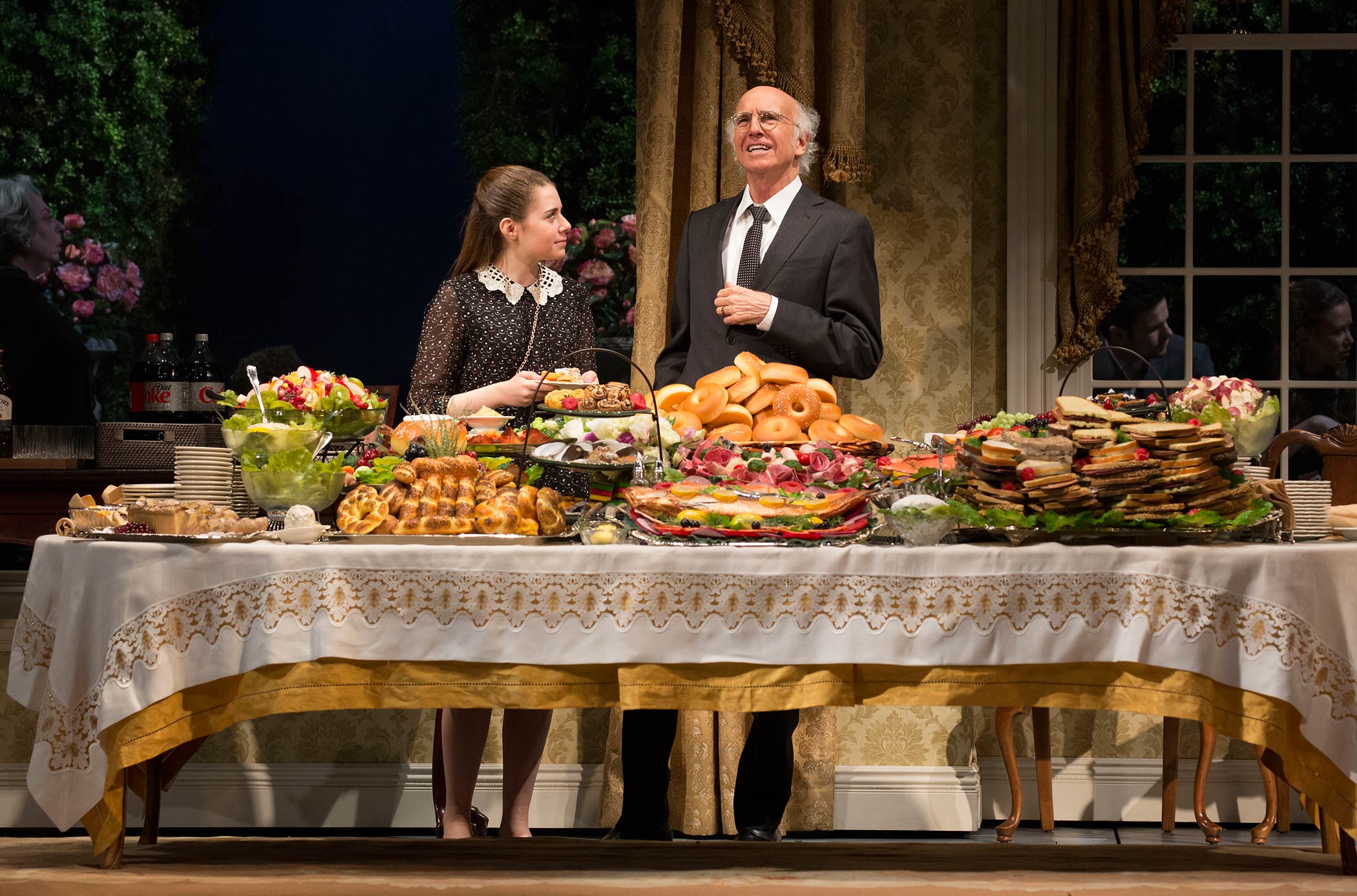
The Cort Theater has the worst men’s room on Broadway. The line at intermission for the undersized facility starts upstairs at the bar, snakes down the steps and then winds back and forth like the Saturday-afternoon queue for Space Mountain at Disneyland. At a recent performance of Larry David’s Fish in the Dark, a couple of dozen patrons were still waiting their turn when an usher announced that the curtain for Act II would go up in exactly five minutes — and anyone not in their seat would be denied admission for the rest of the play.
I tell this not to expose my bladder issues, or to complain about officious, anti-consumer Broadway theater policies (though I could). It just seemed like the perfect set-up for a Larry David routine. Imagine his cry of petulant indignation at the notion that, thanks to a theater’s inadequate bathroom facilities, paying customers might be barred from the show’s second act and forced to take a premature cab ride home.
Then again, they wouldn’t be missing a lot. David’s first Broadway play, which opened last night after weeks of buzz and booming box-office business, runs barely two hours, but it seems padded out, overpopulated (18 characters — enough for a Shakespeare history play!), and funny only in spurts. It’s great to see David, the star and creator of the popular HBO series Curb Your Enthusiasm, taking a crack at Broadway. But for all the audience’s indulgent laughter and the obligatory standing ovation at the end, one can’t help but detect a certain, well, lack of enthusiasm.
The play is certainly made to order. David plays Norman Drexel, a version of the familiar character he portrays on Curb: a dyspeptic curmudgeon who is constantly exasperated by the petty slights, annoyances and absurdities of everyday life. The play opens in a hospital waiting room, where Norman’s father is dying and assorted family members are coming to pay their last respects — and squabble over everything from which son will have to take care of Mom to who gets Dad’s Rolex watch.
On Curb Your Enthusiasm (and before that on Seinfeld, the hit NBC sitcom he created with Jerry Seinfeld), David proved himself a master of structure: weaving three or four storylines each week into a neat, 30-minute operetta of comic angst. With a two-act play to fill up, David has made everything bigger. The first predicament facing the family is whether the dying patriarch should be hooked up to a ventilator to prolong his life or not. A promising avenue for David’s dark, politically incorrect comedy — but he drops it after 20 minutes with perfunctory haste, and nary a punch line. From there the plot meanders through complications both consequential (the maid reveals that she and the dead man had a secret affair — and a love child) and superfluous (Norman’s daughter won’t drop the British accent she’s sporting for her starring role in My Fair Lady).
Onstage, David is bigger too. His whiny voice and perplexed expressions are perfectly sized for the small screen. Here he has to project his trademark shrug to the back of the mezzanine — hunching up his shoulders and stretching his arms so wide he looks like a seagull coming in for a landing at Kennedy Airport.
Still, David works hard to please, and he is helped out by pros like Rita Wilson, as Norman’s wife, Ben Shenkman, as his brother, and Louis J. Stadlen, as a loudmouth uncle. Fish in the Dark is hardly devoid of laughs — like a running gag about tipping doctors, and the story behind the play’s mystifying title, which involves a dinner where Dad almost choked on some fish bones because it was too dark to see the food.
But for a comedy writer who practically reinvented the TV sitcom, it’s surprising to see how clumsy and old-fashioned David’s playwriting is. For each of the many scene changes, the curtain has to drop, while the audience is distracted by a video projection of a death certificate and perky, ba-da-ba-da-ba vocals that sound like they come from a 1960s Ross Hunter comedy. Given the sorry state of recent Broadway comedy (Vanya and Sonia and Masha and Spike won a Tony award!), Fish in the Dark may be just diverting enough to satisfy theatergoers who are paying up to $500 to see Larry David’s hangdog act on stage. To that, I can only respond with a shrug.
More Must-Reads from TIME
- Donald Trump Is TIME's 2024 Person of the Year
- Why We Chose Trump as Person of the Year
- Is Intermittent Fasting Good or Bad for You?
- The 100 Must-Read Books of 2024
- The 20 Best Christmas TV Episodes
- Column: If Optimism Feels Ridiculous Now, Try Hope
- The Future of Climate Action Is Trade Policy
- Merle Bombardieri Is Helping People Make the Baby Decision
Contact us at letters@time.com